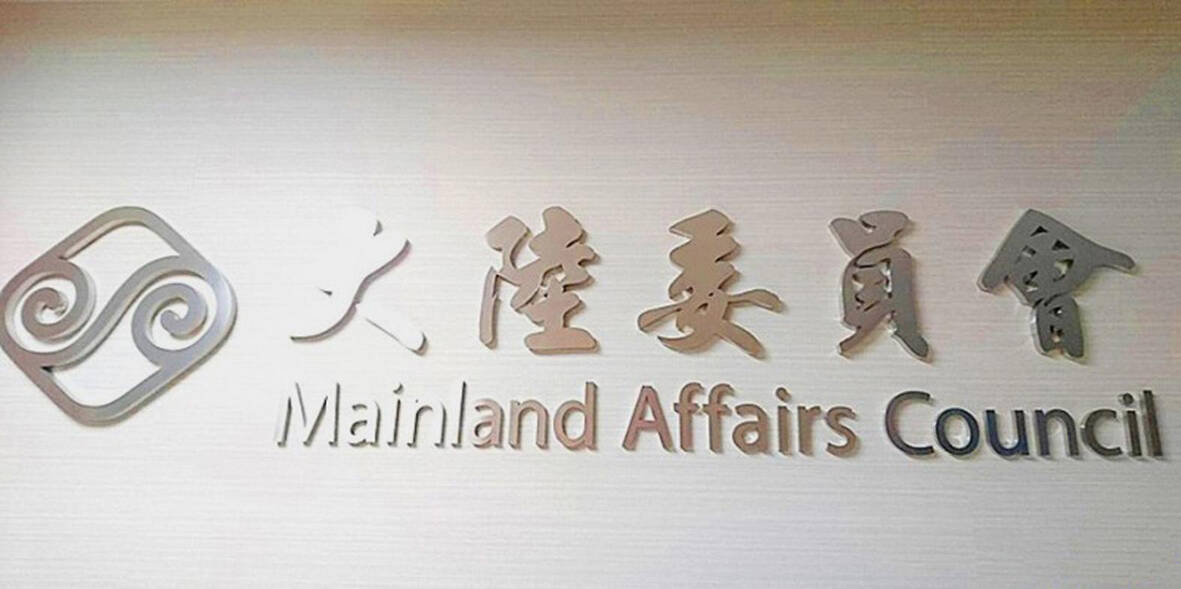The Mainland Affairs Council (MAC) yesterday, for the first time, explicitly branded China’s trade barrier investigation of Taiwan as a move intended to interfere with January’s presidential election.
The Chinese Ministry of Commerce on April 12 announced that it was launching a probe into trade barriers imposed by Taiwan on 2,455 Chinese agricultural products, textiles, coal, minerals, metals, plastics, rubber, chemicals and construction materials.
The announcement was made on the day that Vice President William Lai (賴清德) was nominated by the Democratic Progressive Party as its presidential candidate.

Photo: Chung Li-hua, Taipei Times
A week prior to the announcement, President Tsai Ing-wen (蔡英文) met US House of Representatives Speaker Kevin McCarthy in California after traveling to Guatemala and Belize.
The ministry said that it planned to complete the investigation by Oct. 12, but it could be extended to Jan. 12 next year.
That is the day before Taiwan’s election.
The restrictions on Chinese goods were implemented when Taiwan joined the WTO, and China had voiced no objection over the years, the MAC said.
The sudden launch of the investigation and its time line is clearly politically motivated, the MAC said, adding that it is an obvious attempt to interfere with Taiwan’s election using economic coercion.
Hsu Chia-hao (許家豪), an assistant professor at National Sun Yat-sen University’s Si Wan College, yesterday said that the timing did show Beijing’s determination to influence Taiwan’s elections using economic coercion.
The result of the investigation could be published during the campaign period to sway the election, or it could be used afterward depending on the outcome of the vote, Hsu said.
If the candidate China supports fails to win the election, the investigation could be used by Beijing as “punishment,” he said.
Beijing has tried to win people’s hearts by offering economic and trade benefits since former president Ma Ying-jeou (馬英九) was in power, a strategy that proved unsuccessful during the 2016 and 2020 presidential elections, Hsu said.
China is expected to continue its politically motivated economic coercion against Taiwan, but would focus more on military and diplomatic pressure, he said.
The Chinese Ministry of Commerce on Thursday announced that the number of items under investigation had been adjusted to 2,509.
General Chamber of Commerce chairman Paul Hsu (許舒博) yesterday said that cross-strait tensions could lead to anything, as hostile US-China relations are causing all kinds of problems.
Taiwan and China are important trading partners, he said, adding the two sides should show mutual goodwill and improve relations by communicating more.

A magnitude 7.0 earthquake struck off Yilan at 11:05pm yesterday, the Central Weather Administration (CWA) said. The epicenter was located at sea, about 32.3km east of Yilan County Hall, at a depth of 72.8km, CWA data showed There were no immediate reports of damage. The intensity of the quake, which gauges the actual effect of a seismic event, measured 4 in Yilan County area on Taiwan’s seven-tier intensity scale, the data showed. It measured 4 in other parts of eastern, northern and central Taiwan as well as Tainan, and 3 in Kaohsiung and Pingtung County, and 2 in Lienchiang and Penghu counties and 1

FOREIGN INTERFERENCE: Beijing would likely intensify public opinion warfare in next year’s local elections to prevent Lai from getting re-elected, the ‘Yomiuri Shimbun’ said Internal documents from a Chinese artificial intelligence (AI) company indicated that China has been using the technology to intervene in foreign elections, including propaganda targeting Taiwan’s local elections next year and presidential elections in 2028, a Japanese newspaper reported yesterday. The Institute of National Security of Vanderbilt University obtained nearly 400 pages of documents from GoLaxy, a company with ties to the Chinese government, and found evidence that it had apparently deployed sophisticated, AI-driven propaganda campaigns in Hong Kong and Taiwan to shape public opinion, the Yomiuri Shimbun reported. GoLaxy provides insights, situation analysis and public opinion-shaping technology by conducting network surveillance

‘POLITICAL GAME’: DPP lawmakers said the motion would not meet the legislative threshold needed, and accused the KMT and the TPP of trivializing the Constitution The Legislative Yuan yesterday approved a motion to initiate impeachment proceedings against President William Lai (賴清德), saying he had undermined Taiwan’s constitutional order and democracy. The motion was approved 61-50 by lawmakers from the main opposition Chinese Nationalist Party (KMT) and the smaller Taiwan People’s Party (TPP), who together hold a legislative majority. Under the motion, a roll call vote for impeachment would be held on May 19 next year, after various hearings are held and Lai is given the chance to defend himself. The move came after Lai on Monday last week did not promulgate an amendment passed by the legislature that

AFTERMATH: The Taipei City Government said it received 39 minor incident reports including gas leaks, water leaks and outages, and a damaged traffic signal A magnitude 7.0 earthquake struck off Taiwan’s northeastern coast late on Saturday, producing only two major aftershocks as of yesterday noon, the Central Weather Administration (CWA) said. The limited aftershocks contrast with last year’s major earthquake in Hualien County, as Saturday’s earthquake occurred at a greater depth in a subduction zone. Saturday’s earthquake struck at 11:05pm, with its hypocenter about 32.3km east of Yilan County Hall, at a depth of 72.8km. Shaking was felt in 17 administrative regions north of Tainan and in eastern Taiwan, reaching intensity level 4 on Taiwan’s seven-tier seismic scale, the CWA said. In Hualien, the